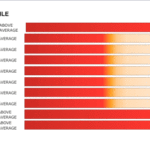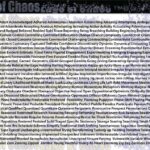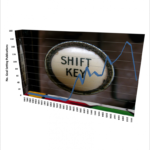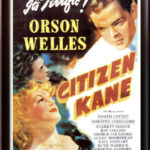We remain in the grip of goal-setting, indeed it is goal setting season. Newspapers are full of incoherent advice about how to make the New Years resolutions stick, but none that I’ve seen offer anything beyond injunctions that one must “really really” want something, or failing that sharing with others your goals so you are held to them or shamed. Well for many years I really really wanted to walk out onto Lords Cricket ground to bat or bowl for England, or more recently my adopted Australia. Despite my dreaming, my telling all who would listen – I even resorted to practising my cricket skills – somehow both the English and Australian cricket teams have struggled through the last 20 years without calling upon my services.
Not one to wallow for too long (about a decade was enough), luckily I was able to distract myself over the last ten years investigating the possibilities of using Chaos Theory to describe career behaviour. It has been a good decade for Chaos Theorists, and a spectacular couple of years. Regular readers of my Fairfax column (The Ladder/ Brightside) may be familiar with some of the examples of chaos in action. The most obvious recent example being the Global Financial crisis, but to that you could add the SARS problem, 9/11, Swine Flu and Susan Boyle.
It wasn’t all bad, there were some positive unpredictable and non-linear events too. For instance, what about Lisa Campbell from University California Berkeley Police Department who said in a interview with CNN’s AC360,” He was clearly animated, he was very passionate, he was full of life about the things he wanted to talk about, the girls sort of were recessed in the background. And they were young. It was one o’clock in the afternoon. They weren’t in school. They were pretty much unresponsive emotionally, extremely pale … there was just something about the girls that wasn’t right.” Campbell was describing the hunch that led to finding and freeing Jaycee Dugard who, the police allege, was abducted when she was eleven and held for eighteen years by the suspiciously acting man. She was freed simply because a smart police officer had a “hunch”. She didn’t plan to get abducted that day, and no-one could have predicted that an intuition could so radically and happily transform her life 18 years later.
Despite these events, or perhaps because of them, we seek to tame our world into conforming predictability. Fear is the key as Alistair Maclean once observed. We are so fearful of the unanticipated events in our lives that we seek to limit or eliminate them. Generally we seek freedom from our fears but make ourselves prisoners by incarcerating our behaviour within rigidly set boundaries. There is no doubt that this can sometimes be useful or even lifesaving. Fearing our drug habit will kill us, restricting our behaviour to eliminate the drugs seems an obviously sensible idea. But try telling that to an addict. All that is required is a little mental trick, set a goal of no more drugs and it will happen. Generally speaking, it wont. Because the addict knows that there are limits to personal control, and there is much that is beyond our control. We need support from others and sometimes we need a lucky break or an intuition. The goal addicted either do not understand this or wilfully ignore it. Goals are not set from fear because fear doesn’t clarify thinking, it distorts it. Rather goals are based on the hubristic premise that we can both predict and control events.
If you cannot predict, you cannot set a goal because goal setting is really a prediction made personal through desire. The quote attributed to many including a Physicist and a Baseball coach (but sadly never to an economist), “it is difficult to make predictions, especially about the future” should be sufficient warning that embarking upon goal setting is, as my old PhD supervisor was wont to say, a “non trivial” task. I never much liked the phrase “non trivial” but used it regularly in my eagerness to appear like a cognitive scientist even if my ideas and data required the indulgence of real cognitive scientists to permit me a day pass to their world. Now I rather like the phrase because it reminds me that my implicit assumption that it is the trivial that is infrequent is precisely wrong.
If the most reliable predictions are to be made about the past, then our predictions are doomed to be limited to our limited experience. This seems to work tolerably well in athletics where most goals are nothing more than backward looking futurism “I want to do what he did, but faster”. Using your imagination to create goals is frowned upon in Athletics. Usain Bolt’s reaction to winning a gold medal for running like a cheetah with a deadline was “I’ve been dreaming of this since I was like yea high….Anything is possible If I put my mind to it. I’m just looking forward to my birthday tomorrow. Actually, I’m 22 now.” Two goals – one of the I want to do it faster variety, and the other wisely looking forward to something that has already happened. That is the sign of surefire winner. In their movie The Sting, Robert Redford and Paul Newman found betting on races already run was a great way to make a buck. An eminent academic researcher apparently used a similar tactic to gain research funding by supplying grant applications replete with proposed studies that they had already successfully completed but not yet published.
The mother of all experience is not always to be relied upon. Uncertainty is no respecter of past certainties, if it was historians would be out of business, and relying on past events may not give the desired outcome. If Jack Nicholson looked to his mother for wisdom, he was looking in the wrong direction for 38 years and should have been looking at his sister who he discovered in 1974 was in fact his mother.
Laurel and Hardy seemed to have a great formula, small variations on what went before were sufficient to keep the world laughing, new plans could be reliably based on old plans. By the 1940s they were slipping, and by the 1950s they were gone, and the Goons were in. Laurel and Hardy hadn’t changed, but the world had and comedy had too. Once the goal is set, you are not supposed to change. Pity that the world thinks differently.
Newman and Redford’s The Sting garnered 7 Oscars and $156million at the box office in 1973, but that was cold comfort for the makers of the imaginatively titled “The Sting 2” from 1983 that to date has been overlooked by the Academy, probably because none of the them saw it. A $6 million box office giving those few ticket buyers a cinema experience more isolating than solo round the world sailing. The past is not always the best place to formulate goals.
The future seems more promising to all but pessimists, and generally turns out that way. If it didn’t the pessimists would all be accurate futurists – a truly pessimistic prospect. Unless we wait patiently for it to arrive, the future charges imagination as the price of admission.
The goal-setter feels they have imagined only too well what it is that they want or desire. The limitations here are clear, how do we know what we want until we see it, how do we know what we think until we’ve said it? Nobody set the goal in 1983 of using the money they saved by not seeing The Sting 2 to put toward buying an iPad, because it was beyond our imagination.
Goal-setting doesn’t challenge our imagination, rather it consolidates and rules out further acts of imagination. Goal-setting closes the deal, it locks us in, commits us. In our haste to “get on and do something” or worse to be seen to be doing something, we rush to a plan, a goal, and in so doing we fail to consider the creative and imaginative possibilities that may offer alternatives.
Luckily, this act of gross over-simplification creates only short-term damage, because inevitably life will happen when we are making these other plans. John Lennon, the author of that observation was busy making other plans about his next album when he was murdered.
When people appreciate the inherent unpredictability in the world, they can be forgiven for thinking that unpredictability is all there is. Clive James did not expect his Father to die in a plane crash, robbed so cruelly by the plane carrying him home to freedom after wartime incarceration. In North Face of Soho (Picador, 2006), James writes about finding his Father’s grave: “Down the hill between the terraces of headstones, the long lawn that tilts down to the sea, I walked to find his name and number. When I did, I fell to my knees and cried. I cried to heaven, which never listens, but has the excuse that it never causes anything either. There is only chance.” (pp258).
If it were true that there is only chance, then where does meaning come from? Can anyone make sense? Does anything make sense? The reader of North Face of Soho does not have to carry the dead weight of existential nihilism for too long, for Clive James clearly believes there is more when he writes only four pages later: “When the writer is licking his wounds after a public disaster, he has been given time to remember what he was put on earth to do. He might one day make history and might even make a million pounds, but the first thing he must do is make sense” (pp262, North Face of Soho).
How can a writer succeed if they were only chance? What would be the point? How many chance events can a plot contain before the reader recommences belief? If there was only chance then the writer’s aim is not sense-making or truth, but rather promoting the allusion of sense and false hopes of truth.
In making sense of the chaos it is an easy mistake to exaggerate either the chaos or the sense, the surprise or the pattern. Despair or even worse fatalism results from believing completely in the former and hubris, inflexibility, foolhardiness and goal setting result from believing completely in the latter. Ultimately neither are useful positions to take in the medium to long term.
The goal-addicted often seem to construe the world in this extreme “either or” manner, as though any suggestion that they move from goal-setting as their only way of dealing with the world is an invitation give up all efforts at personal control or purpose. It is not that goal setting has no value, rather that it has limitations, and these are rarely considered.
In the short-term goal-setting can move us to action, but as the problems become more complex, or the time between setting them and expecting to achieve them lengthens sufficiently to admit all of the other complexities of life, their use becomes questionable or even counter-productive. In a world that increasingly demands creative solutions, we should look for processes that foster rather than stymie that creativity.
Before we rush to set a goal and therefore eliminate nearly all possibilities, we might consider the virtues of thinking, imagination, dreaming, experiencing, experimenting and the excitement and amusement that only the unexpected can deliver.
If we can predict anything at all it is that most of the goals set during annual goal-setting week (aka New Year) will have been abandoned, if not by next week then soon after, but the uber goal-setters will be so focussed on their goals they will not see that they have failed to achieve them.
Jim Bright is a consultant organisational psychologist and Professor of Career Education and Development at ACU. He is the co-author of the forthcoming Chaos Theory of Careers, to be published by Routledge on 2010.
Related Posts








Pingback: Tweets that mention Goal setting: a challenge for the imagination or a crisis of imagination? | The Factory -- Topsy.com
i truthfully love your own writing type, very remarkable.
don’t quit and also keep posting due to the fact that it simply that is worth to read it.
impatient to look over more of your own articles, good bye 😉
Pingback: Dreaming Too Small? Goal-setting Advice that Works
Pingback: Why people dont get uncertainty | The Factory
Pingback: Goals are not enough for success in a Chaotic world | The Factory